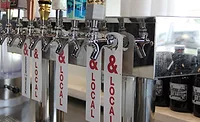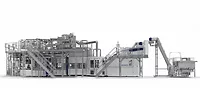Liquid supplements make strides in a changing landscape
Consumers show favorable image of supplements.
The old saying that “An apple a day keeps the doctor away” might someday transition to “A supplement a day keeps the doctor away” as topics such as the U.S. obesity rate, an aging baby boomer generation, and increased energy/alertness continue to bring attention to the nutritional/dietary supplement segment, according to market research firms.
Rockville, Md.-based Packaged Facts estimates in its September 2012 report, “Nutritional Supplements in the U.S., 5th Edition,” that U.S. retail sales of nutritional supplements reached $11.5 billion in 2012, up 6.5 percent from 2011 sales, based on Chicago-based Information Resources Inc. (IRI)’s InfoScan data from mass market retailers, reported revenues of individual companies, and figures appearing in the trade press. The market research firm also estimates that the market grew 31.7 percent from 2008 to 2012 and posted a compound annual growth rate of 7.1 percent with consistent, even growth throughout the time period.
Various consumer trends influenced the nutritional supplement market’s growth during that time period, Packaged Facts reports.
“The rising health care costs of the past decade have been one of the factors encouraging consumers to turn to supplements as a more affordable way to stay healthy,” the report states. “Accordingly, even cash-strapped consumers used to taking supplements have been reluctant to eliminate them from their regimens. At the same time, older consumers are more likely to integrate supplements into their daily lives, and as the baby boomer population moves into the senior age bracket, the supplement industry continues to widen its customer base.”
Projecting retail sales of nutritional supplements to reach $15.5 billion by 2017, Packaged Facts notes that one of the driving factors will be the aging baby boomer generation; however, sales could grow even more if new research findings are developed or marketers are able to appeal to the Hispanic population, it adds.
Santa Monica, Calif.-based IBISWorld reports in its October 2012 report, “Vitamin & Supplement Manufacturing in the US,” that changing attitudes among U.S. consumers have affected other product categories in the industry and provided sales opportunities.
“Consumers are becoming more health conscious due to a variety of factors including experiencing the effects of aging, mounting health care costs and rising obesity rates,” IBISWorld reports.
Noting that the median age has risen for decades, the market research firm says that the aging population has contributed to industry growth.
“Two distinct trends have driven the uptick: a declining birth rate and longer life spans,” IBISWorld reports.
Liquid assets
Although pill formats dominate the majority of the dietary supplements market, liquid-based products are growing in popularity, according to market data.
In its “Nutritional Supplements in the U.S.” report, Packaged Facts classified supplements into four categories: general supplements, including mineral, herbal and other non-vitamin supplements as well as combination supplements, also referred to by IRI as mineral supplements; multivitamins; one- and two-letter vitamins; and liquid supplements, including vitamin, mineral, herbal and other supplements in liquid form, also referred to by IRI as liquid vitamins/minerals. Nutraceutical foods and beverages, including herbal teas, were not formally included unless they are primarily a supplement or an extension of a supplement line, the report states.
Of the four categories tracked by IRI, liquid supplements occupied the smallest share with 6 percent of sales, according to the Packaged Facts report. However, the segment was the fastest growing with a 14 percent increase — the same growth rate of the supplements category from 2010 to 2011 — during the 52 weeks ending June 10, 2012, in supermarkets, drug stores and mass merchandisers, excluding Walmart.
Based on current IRI data, liquid vitamins/minerals increased 20 percent for $420.7 million in U.S. supermarkets, drug stores, mass merchandisers including Walmart, gas and convenience stores, military commissaries, and select club and dollar retail chains for the 52 weeks ending Feb. 24.
Topping the list was Alacer Corp. with approx-imately $121 million in sales, a 19.3 percent increase from the previous time period. Maker and distributor of the Emergen-C effervescent, powdered drink mix vitamin supplement, the company was acquired by Pfizer Inc., New York, last year.
Available in more than 15 flavors, the seven lines of Emergen-C contain vitamin C, B vitamins, electrolytes and antioxidants. The brand also offers Emergen-C Kidz, which was designed specifically for children, and specialty formulas that support specific health needs such as joint health and heart health.
Showing strong growth, NeuroBrands LLC, Los Angeles, increased 63.6 percent for more than $50 million in sales in IRI-measured channels. Featuring a lifestyle brand lineup that includes formulations that address energy, sleep, vitamin D deficiency as well as other needs and interests, the Neuro product line was developed in 2008 when Diana Jenkins, founder, chairwoman and chief executive officer of NeuroBrands, was looking for a beverage to address consumers’ desires, the company told Beverage Industry in April 2011.
The Neuro lineup features seven products: Bliss, which contains chamomile blended with l-theanine; Passion, which features caffeine combined with l-citrulline; Sleep, which includes melatonin and magnesium; Sport, which features potassium mixed with magnesium; Sonic, which contains caffeine fused with l-theanine; Sun, which provides 1,000 international units of vitamin D in each bottle; and Trim, which includes fiber.
Packaged in 14.5-ounce bottles, all Neuro products are labeled as either nutritional supplements or dietary supplements except for Sport, which is classified as a sports beverage on the bottle.
Of the Top 10 liquid vitamins/minerals, only two did not record growth numbers: private label, which was down 3.5 percent, and Botanical Laboratories, a liquid supplement manufacturer based in Ferndale, Wash., which was relatively flat for the 52-week period.
But when it comes to product claims, liquid supplements might not be that different from the rest of the supplement market.
“From a health claim perspective, liquid supplement products do not markedly differ from their tablet or capsule counterparts,” says Stephanie Prymas, consumer health analyst with Euromonitor International, Chicago. “For energy products, liquid formats are typically marketed as faster-acting, but this kind of claim is less relevant for multivitamins and the like. For liquid supplements such as calcium or glucosamine, fast absorption is the most popular claim.”
Similar to traditional beverages, functionality is a popular claim for supplements. “Functional claims are the lifeblood of the liquid supplement market,” says Kristin Rose, beverage market analyst with Packaged Facts. “Although functional claims aren’t necessarily diet related, such attributes carry a healthy halo.”
Standing out from competitors and offering consumers a convenient format are some of the motivators for new liquid supplement launches, Prymas explains.
“Beverage formats are positioned to fit seamlessly into consumers’ busy lives and also avoid negative connotations [that] users may ascribe to ‘taking pills,’” she says. “Additionally, liquids are attractive to individuals who have difficulty swallowing tablets, though formats like chewables and gummies are alternative options for this demographic.”
Understanding the market
As the liquid supplement market continues to grow, being able to discern supplement products from traditional beverages has become a growing topic.
“Functional beverages are in high demand as consumers look to incorporate more nutrients into their diets,” Prymas says. “This creates a rather large gray area where many beverages are virtually identical to liquid supplements — save the former having a nutrition facts label rather than a supplement facts one.”
In December 2009, the U.S. Food and Drug Administration (FDA) drafted the report, “Guidance for Industry: Factors that Distinguish Liquid Dietary Supplements from Beverages, Considerations Regarding Novel Ingredients and Labeling for Beverages and Other Conventional Foods.” In the background section, the FDA reports two trends taking place when it comes to the marketing of beverages: the increase in the marketing of beverages as dietary supplements while the packaging and labeling of many liquid products represent the products as conventional foods, and growth in the number of beverages and other conventional foods that contain novel ingredients, including botanical ingredients or their extracts, which previously had not been used in conventional products, might be unapproved additives, and also might bear claims that misbrand the product or otherwise violate the Federal Food, Drug and Cosmetic Act (FFDCA), the FDA stated.
Referencing the FFDCA, the guidance states that the term “dietary supplement” refers to a product that, among other requirements, “is not represented for use as a conventional food or as a sole item of a meal or the diet.” It adds that beverages are considered conventional foods under the FFDCA.
“Even when the label of a liquid product characterizes it as a dietary supplement, the product may not in fact be a dietary supplement,” according to the FDA’s guidelines on dietary supplements. “Liquid products can be represented as conventional foods as a result of factors such as their packaging, the volume in which they are intended to be consumed, their product or brand name, and statements about the product in labeling or advertising. For example, the pack-aging of liquid products in bottles or cans similar to those in which single or multiple servings of beverages like soda, bottled water, fruit juices and iced tea are sold suggests that the liquid product is intended for use as a conventional food.”
In August 2012, the FDA announced that it is developing guidance on distinguishing liquid supplements from conventional beverages, following up on the draft guidance that was issued in December 2009. The FDA still is determining a timeline for its release, it says.
“At present, the key regulatory difference between beverages and supplements is that supplement makers must inform the FDA of adverse health events associated with their products; the same standard does not apply to beverages,” Euromonitor’s Prymas says.
Although the adverse event-reporting requirement for supplements might be an incentive for some companies to officially shift beverage-like supplements to being regulated as standard beverages, consumers are not as invested in the labeling and regulation differences, she adds.
“From a consumer perspective, the official positioning — beverage vs. liquid supplement — is more or less irrelevant,” Prymas explains. “Consumers simply want to feel that they are making healthy choices and are particularly drawn to products that help them do so in a convenient, routine way.”
Nutritional and functional benefits also are appealing for consumers. Even though dietary supplements don’t have the same review process as beverages, consumers still have a favorable and safe impression of them, Packaged Facts’ Rose says.
Looking for a reprint of this article?
From high-res PDFs to custom plaques, order your copy today!







